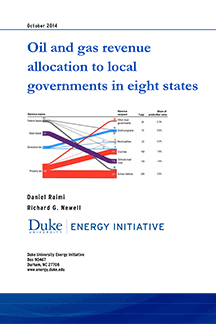Shale Public Finance
The Shale Public Finance project seeks to identify the key public finance issues facing local governments where large-scale oil and gas development is occuring
Overview
In recent years, technological advances have led to a dramatic increase in natural gas and oil production in many regions of the United States. With increased production comes new revenues—and new challenges—for local and state governments.
The Shale Public Finance project, launched at Duke University and now being undertaken at RFF, seeks to identify the key public finance issues facing local governments that are dealing with an unpredictable and rapidly changing oil and gas landscape. The project has examined every major onshore oil and gas producing region of the United States from 2013 through 2016, and ongoing research explores fiscal issues associated with an uncertain outlook for oil and gas activity in the coming years.
Research conducted from 2013 through October 2016 was carried out at the Duke University Energy Initiative with support from the Alfred P. Sloan Foundation.
Summaries of findings to date can be found using this interactive map.
Project Objectives
The project aims to identify key fiscal issues faced by local governments experiencing changes in levels of oil and gas development, and determine and describe policy approaches for managing these issues. Researchers working on this project seek to answer the following specific research questions:
- What are the fiscal impacts to local governments from oil and gas development in the shale gas and tight oil era? How have these impacts changed over time, and how have they varied from region to region?
- Have varying state and local policies provided sufficient funding to manage any challenges associated with increased or decreased oil and gas activity?
- What lessons can be learned from state and local government responses to fiscal impacts related to oil and gas development?
Project Activities
- Analyze local and state government financial data to identify effects of oil and gas development on local government revenues and outlays.
- Analyze existing state fiscal policies relevant to oil and gas development in the top 16 oil and gas producing states.
- Conduct structured interviews with local government officials, industry stakeholders, and state government officials in these states.
- Hold stakeholder workshops to share information and explore policy options.
Outputs
- Multiple publications describing research and analysis on the issues above, along with case studies of specific communities and their approaches to dealing with the relevant fiscal issues.
- Publications will present findings and—if warranted—identify best practices and recommendations.








